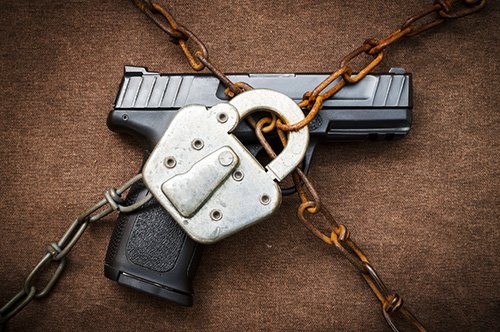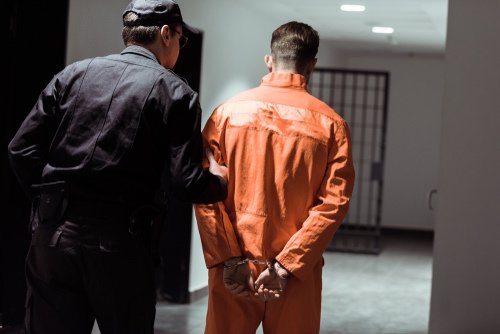Artículo 29825 del Código Penal es la ley de California que hace que sea un delito para una persona poseer, comprar o poseer un arma de fuego cuando hay una orden judicial prohibiendo que esa persona lo haga. Una persona comete este delito incluso si el arma involucrada no funciona. Una violación de esta sección puede llevar a cargos felony y tiempo en la cárcel o la prisión.
El lenguaje de la sección del código dice lo siguiente:
29825. (a) Una persona que compra o recibe, o intenta comprar o recibir, un arma de fuego sabiendo que está prohibido hacerlo en cualquier jurisdicción por una orden de restricción temporal o una orden de injunción emitida de conformidad con la Sección 527.6, 527.8 o 527.85 del Código de Procedimiento Civil, una orden de protección según lo definido en la Sección 6218 del Código de Familia, una orden de protección emitida de conformidad con la Sección 136.2 o 646.91 de este código, una orden de protección emitida de conformidad con la Sección 15657.03 del Código de Bienestar e Instituciones, o por una orden válida emitida por una jurisdicción fuera del estado que sea similar o equivalente a una orden de restricción temporal, una orden de injunción o una orden de protección especificada en esta subdivisión, que incluya una prohibición de poseer o poseer un arma de fuego, es culpable de un delito público, sancionado con prisión en una cárcel del condado no excediendo un año o en la prisión estatal, con una multa no excediendo mil dólares ($1,000), o con ambas, esa prisión y multa.
(b) Una persona que posee o posee un arma de fuego sabiendo que está prohibido hacerlo en cualquier jurisdicción por una orden de restricción temporal o una orden de injunción emitida de conformidad con la Sección 527.6, 527.8 o 527.85 del Código de Procedimiento Civil, una orden de protección según lo definido en la Sección 6218 del Código de Familia, una orden de protección emitida de conformidad con la Sección 136.2 o 646.91 de este código, una orden de protección emitida de conformidad con la Sección 15657.03 del Código de Bienestar e Instituciones, o por una orden válida emitida por una jurisdicción fuera del estado que sea similar o equivalente a una orden de restricción temporal, una orden de injunción o una orden de protección especificada en esta subdivisión, que incluya una prohibición de poseer o poseer un arma de fuego, es culpable de un delito público, sancionado con prisión en una cárcel del condado no excediendo un año, con una multa no excediendo mil dólares ($1,000), o con ambas, esa prisión y multa.
(c) Si se otorga la libertad condicional al ser condenado por una violación de esta sección, el tribunal impondrá la libertad condicional de acuerdo con la Sección 1203.097.
El Consejo Judicial proporcionará aviso sobre todas las órdenes de protección emitidas dentro del estado de que al demandado se le prohibe poseer, comprar, recibir o intentar comprar o recibir un arma de fuego mientras la orden de protección esté en vigor. La orden también deberá indicar que un arma de fuego poseída o poseída por la persona deberá ser entregada al organismo de aplicación de la ley local para esa jurisdicción, vendida a un distribuidor de armas de fuego con licencia o transferida a un distribuidor de armas de fuego con licencia de conformidad con la Sección 29830 por el período de tiempo que la orden de protección esté en vigor, y que la prueba de entrega o venta deberá presentarse dentro de un plazo especificado de recibo de la orden. La orden deberá indicar en su cara las sanciones por una violación de la prohibición. La orden también deberá indicar en su cara la fecha de vencimiento para la entrega.
Nuestros abogados de defensa criminal de California responderán las siguientes preguntas en este artículo:
- 1. ¿Cuándo es un delito tener un arma después de una orden judicial?
- 2. ¿Hay defensas legales para el Código Penal 29825?
- 3. ¿Cuáles son las penas?
- 4. ¿Hay consecuencias migratorias?
- 5. ¿Puede una persona obtener una condena expurgada?
- 6. ¿Cómo afecta una condena los derechos de portar armas?
- 7. ¿Hay delitos relacionados?

El Código Penal 29825 hace que sea un delito poseer, comprar o tener posesión de un arma de fuego cuando hay una orden judicial que prohíbe a esa persona hacerlo.
1. ¿Cuándo es un delito tener un arma después de una orden judicial?
Un fiscal debe probar lo siguiente para condenar a una persona bajo esta ley de California:
- el acusado poseía, compraba, recibía o tenía posesión de un arma de fuego,
- el acusado sabía que poseía, compraba, recibía o tenía posesión de un arma de fuego,
- un tribunal había ordenado que el acusado no poseyera, comprara, recibiera o tuviera posesión de armas de fuego, y
- el acusado sabía de la orden del tribunal.1
El Estado de California dice que un “arma de fuego” es:
- cualquier dispositivo diseñado para ser usado como arma, y
- de la cual un proyectil es expulsado a través de un cañón por la fuerza de una explosión.2
No es necesario bajo el PC 29825 que la arma mortal sea una arma de fuego cargada.
Tenga en cuenta que una persona violará esta ley incluso si la pistola que tenía no funcionaba. Todo lo que se requiere es que el objeto esté diseñado para disparar y parezca capaz de disparar.3En cuanto al tercer elemento anterior, las siguientes órdenes judiciales están sujetas a esta ley:
- Órdenes de protección (como una orden de restricción por violencia doméstica que, según el Código de Procedimiento Civil de California, impide que una persona acose a otra),
- TROs, y
- injunciones.4
Esta ley es una de varias leyes de California que impiden que ciertas personas posean, posean y compren un arma. Ejemplos de otras personas que pierden sus derechos de armas incluyen:
- personas condenadas por violencia doméstica (esto es cierto tanto bajo la ley de California como bajo las leyes federales de los Estados Unidos),
- personas adictas al uso de cualquier droga narcótica, y
- partes condenadas por un delito grave.
2. ¿Hay defensas para 29825 PC?
Los abogados defensores pueden recurrir a ciertas estrategias legales para decir que los funcionarios de aplicación de la ley detuvieron indebidamente a una persona bajo estas leyes. Estos incluyen mostrar que:
- el acusado no conocía la orden judicial.
- el acusado no sabía que tenía un arma.
- el acusado poseía el arma solo por un momento.
2.1. Sin conocimiento de la orden
Recuerde que una persona solo es culpable bajo PC 29825 si el acusado realmente sabía que había sido nombrado en una orden de restricción. Esto significa que siempre es una defensa para un acusado decir que él / ella no tenía este conocimiento.
2.2. Sin conocimiento de un arma
Recuerde también que una parte solo es culpable bajo este estatuto si:
- él / ella poseía, poseía, compraba o recibía un arma, y
- él / ella realmente sabía que el objeto era en realidad un arma de fuego.
Una defensa, entonces, es que el acusado no tuviera este conocimiento. Por ejemplo, tal vez tuviera un cañón de bastón y solo pensó que era un bastón.
2.3. Posesión momentánea
“Posesión momentánea” siempre es una defensa para estos cargos. Para usarlo, el acusado debe demostrar que él / ella:
- poseía el arma solo por un período momentáneo,
- poseía el arma con el fin de deshacerse de ella, y
- no intencionaba impedir que una agencia de aplicación de la ley o agentes de policía la incautaran.5

Una violación de esta ley puede resultar en una multa y/o tiempo en la cárcel.
3. ¿Cuáles son las penas?
Una violación de esta ley es un delito oscilante. Esto significa que un fiscal puede acusarlo como ya sea un delito menor o un delito grave.
Una falta menor se castiga con:
- prisión por hasta un año en la cárcel del condado, y/o
- una multa máxima de mil dólares.6
Una condena por delito grave es punible con:
- custodia en la cárcel o prisión estatal por hasta tres años, y/o
- una multa máxima de mil dólares.7
4. ¿Hay consecuencias inmigratorias?
Una condena bajo estas leyes puede tener consecuencias inmigratorias negativas.
La ley de California dice que los delitos agravados pueden resultar en que un acusado no ciudadano sea:
- deportado, o
- marcado como inadmisible.
Esto significa que el acusado experimentará resultados de inmigración severos si:
- es condenado por un delito bajo esta ley, y
- los hechos muestran que el delito fue “agravado”.
5. ¿Puede una persona obtener una condena expurgada?
Una persona puede obtener una condena expurgada si:
- la condena fue por un delito menor, y
- el acusado completó exitosamente una pena de prisión o probación.
Sin embargo, una persona no puede obtener una condena de delito grave expurgada. Los expurgos no están permitidos para los delitos que conducen a penas de prisión.
6. ¿Cómo afecta una condena los derechos de portar armas?
Los acusados en estos casos ya habrán perdido sus derechos de portar armas a través de la orden de restricción.
Los infractores pueden recuperarlos, sin embargo, después de:
- cumplir con su sentencia, y
- cumplir con la orden judicial.
Los delincuentes no pueden recuperarlos, sin embargo, ya que los delincuentes condenados pierden todos los derechos de armas.
7. ¿Hay delitos relacionados?
Hay tres delitos relacionados con la posesión ilegal de un arma bajo PC 29825. Estos son:
- violar una orden de restricción – PC 273.6,
- delincuente en posesión de un arma de fuego – PC 29800, y
- posesión de armas después de una condena por delito menor – PC 29805.
7.1. Violar una orden de restricción – PC 273.6
Código Penal 273.6 PC es el estatuto de California que hace que sea un delito para una persona violar los términos de una:
- orden de restricción,
- orden de protección, o
- orden de alejamiento.
Tenga en cuenta que si una persona está sujeta a una de estas órdenes y tiene un arma, entonces puede ser acusado de:
- PC 273.6, y
- PC 29825.
7.2. Delincuente en posesión de un arma de fuego – PC 29800
Código Penal 29800 PC es el estatuto que hace que sea un delito para un delincuente condenado (o una persona con una orden de arresto pendiente por un delito grave) para:
- poseer,
- comprar o
- poseer un arma de fuego.
Esto significa que si una persona es condenada por un delito grave bajo el Código Penal 29825, perderá permanentemente sus derechos de armas.
7.3. Posesión de armas después de una condena por delito menor – PC 29805
Código Penal 29805 PC es el estatuto de California que hace que sea un delito poseer o poseer un arma de fuego, si la persona fue condenada por ciertos delitos menores.
Nota que una condena por delito menor de PC 29825 no resultará en que una persona pierda sus derechos de portar armas bajo esta ley.
Para obtener ayuda adicional…

Contáctenos para obtener ayuda adicional.
Para obtener orientación adicional o para discutir su caso con un abogado de defensa penal, le invitamos a contactarnos en el Grupo de Ley Shouse.
Referencias legales:
- CALCRIM No. 2512 – Poseer un arma de fuego prohibido por una orden judicial. Instrucciones de jurado criminal del Consejo Judicial de California (edición de 2017). Véase también People v. Snyder (1982) 32 Cal.3d 590.
- CALCRIM No. 2512 – Poseer un arma de fuego prohibido por una orden judicial.
- Vea lo mismo.
- Código Penal de California 29825 PC.
- People v. Martin (2001) 25 Cal.4th 1180. Véase también People v. Hurtado (1996) 47 Cal.App.4th 805; y People v. Mijares (1971) 6 Cal.3d 415. Para una discusión general sobre la “posesión” de un arma de fuego, vea People v. Charles (2017) 14 Cal. App. 5th 945.
- Código Penal de California 29825 PC.
- Vea lo mismo. Véase también Código Penal de California 1170h.
